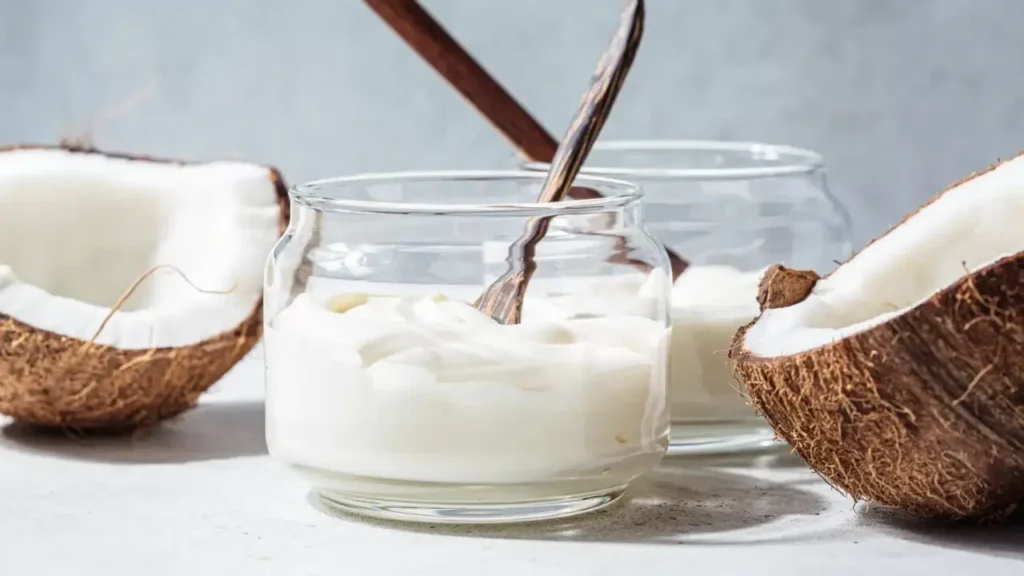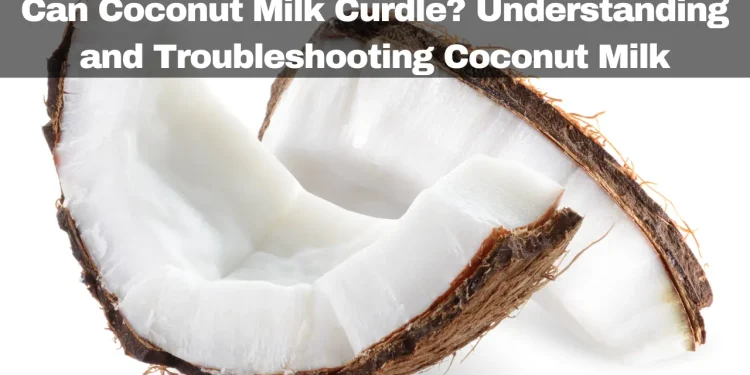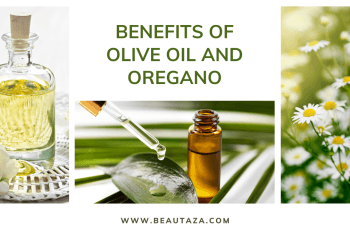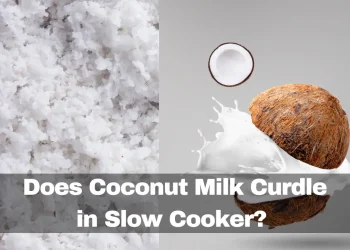Coconut milk is versatile in anything from vegan desserts to Thai curries. It may improve the flavor of any meal since it is creamy and rich with a somewhat sweet and nutty flavor. But if you’ve ever used coconut milk in cooking or baking, you may have wondered whether it might curdle. Curdling is the process by which a liquid separates into solid curds and liquid whey, often due to contact with heat, acid, or enzymes. In this blog post, let’s address the question, “Can coconut milk curdle?”. We’ll examine the science of curdling, explain the causes of coconut milk curdling, and provide advice on how to stop it from occurring.
Additionally, we’ll go through what to do if your coconut milk curls so you can still enjoy your delectable coconut-based dishes without any concerns. Let’s explore the world of coconut milk curdling now!
What is curdling, and why does it happen?
When a liquid, such as milk or coconut milk, is curdled, the liquid whey separates from the solid curds. Heat, acid, or enzymes are a few of the conditions that might cause this separation.
Because heat denatures the liquid’s proteins, which leads to their coagulation and formation of clumps, curdling might occur. Because of this, warm milk often curdles when used to make cheese or custard.
Lemon juice or vinegar are acidic chemicals that may promote curdling because they increase the liquid’s acidity by lowering its pH. This may result in the separation of fat from the liquid and the coagulation and clumping of proteins.
Curdling may also be brought on by enzymes, which are proteins that catalyze chemical processes. For instance, the cheese-making enzyme rennet coagulates milk proteins and divides them into curds and whey.
Can coconut milk curdle?
Yes, coconut milk can curdle. In certain situations, coconut milk can curdle like other liquids containing proteins, fats, and acids. Because coconut milk has a lot of fat, it tends to curdle when exposed to heat or acid.
If you’ve ever used coconut milk in a curry or soup, you may have noticed that it sometimes splits or looks grainy when it gets hot. This means the coconut milk has turned sour.
But it’s important to remember that not all kinds of coconut milk curdle similarly. Because it has more fat, full-fat coconut milk is more likely to separate from light coconut milk, which has less fat. Also, coconut milk with binders like guar gum or carrageenan may be less likely to split.
Why can coconut milk curdle?
Coconut milk may curdle for some reasons, including its high-fat content and acidity.
Coconut flesh and water are blended to make coconut milk, which is then strained to eliminate particles. Proteins and fat are present in the liquid, which may cause it to curdle. Because of its high-fat content, coconut milk is more likely to curdle when exposed to heat or acid. The texture may become clumpy or gritty if the fat separates from the liquid.
Additionally, coconut milk’s pH ranges from 6.0 to 7.5, potentially acidic. The coconut milk’s proteins may coagulate and separate at this acidity level, resulting in curdling.
It’s important to remember that not all coconut milk brands are made equal in curdling. To assist in avoiding curdling, certain brands may add stabilizers such as guar gum or carrageenan. Even when exposed to heat or acid, these stabilizers may help preserve the coconut milk creamy and smooth.
Curdling can occur with different types of coconut milk.
Canned, full-fat, and light coconut milk may curdle. Coconut milk curdles depending on fat content and processing.
Full-fat coconut milk curdles more than light coconut milk. Full-fat coconut milk may separate when heated or acidified.
Canned coconut milk, used in cooking and baking, may curdle. Canned coconut milk stabilized with guar gum or carrageenan may curdle if warmed or exposed to particularly acidic ingredients.
To prevent curdling, boil or mix coconut milk carefully.
How to prevent coconut milk from curdling?
Precautions may prevent coconut milk from curdling. How to avoid coconut milk curdling:
- Overheating causes coconut milk to curdle. Coconut milk shouldn’t boil or simmer. To avoid separation, shake canned coconut milk briskly before opening.
- Cook coconut milk over low to medium heat. High heat won’t separate or curdle the coconut milk.
- Add vinegar or citrus juice to a coconut milk recipe. Start slowly. This reduces the probability of coconut milk curdling from acidity.
- Stabilizers may avoid curdling. Particular coconut milk is stabilized with guar gum and carrageenan.
- Before adding coconut milk, mix the fat and liquid. This reduces curdling and fat separation.

What to do if coconut milk curdles?
You can do a few things to rescue curdled coconut milk:
- Blend it: You may be able to recombine curdled coconut milk if it is still primarily creamy and smooth. The mixture should be soft after blending with a hand mixer or blender.
- Put it through a fine-mesh strainer to eliminate solid chunks if the curdled coconut milk is too clumpy or gritty to combine. This might aid in breaking up any clumps and produce a smoother mixture.
- Take it as-is: Coconut milk that has curdled may still be OK for use, depending on your recipe. You can still use coconut milk in your recipe if the curdling is manageable and could taste good.
- Avoid violent stirring: If your coconut milk is beginning to curdle during cooking, don’t stir it too forcefully, as this might further separate the fat and liquid. Instead, gently swirl the mixture and avoid scraping the pan’s bottom, where the separated fat could have built up.
Conclusion
However, curdling may often be avoided by paying attention to how you heat and combine coconut milk with other ingredients. There are methods of preserving curdled coconut milk, such as mixing or filtering it. You can use coconut milk in your recipes without worrying about curdling if you use these strategies to make it smooth and creamy.
Read –
- Will coconut milk curdle in slow cooker
- How to Improve Grainy Skin Texture on Face | Smooth and Flawless
- How to Fix Saggy Breasts After Breastfeeding | Perk Up Your Confidence
- Benefits of Drinking Olive Oil and Lemon Juice Before Bed
- Does Cutting Hair Short Reduce Hair Fall | Benefits of Short Haircuts






